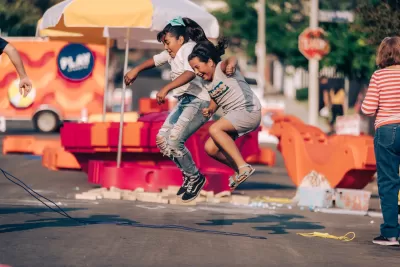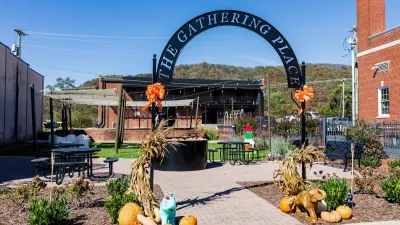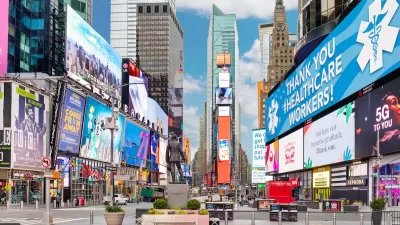'Playable' public spaces can be a powerful tool for creating vibrant, communal, and equitable cities.

The COVID-19 pandemic, writes Ryan Swanson, underscored "how much we value and need physical and social connection through spontaneous interactions, and it stripped us of the moments that once provided us with structured play, such as organized sports." Cities responded with open streets programs and outdoor dining which revealed the possibility for different uses of streets and sidewalks. But "to make our cities healthier and happier," we must take it a step further, argues Swanson, founder of Urban Conga, "a design studio that works with communities to weave spaces for play into the fabric of our cities." Swanson says play is not only "a necessary, universal, lifelong part of the human experience and helps us to discover, explore, and empathize with others," but also "a powerful tool to bridge divides and spark more equitable spaces in our built environment."
To this end, "[e]veryday public facilities — such as park benches, bus stops, street lights, fountains, or any number of other appurtenances — could become ‘PLAY’ces, platforms for open-ended play that provide inclusive, stimulating, creative outlets for communal connection." Such projects have been sporadically and spontaneously installed in U.S. cities, "but any truly effective movement to incorporate play into our public spaces would need the support from our city leaders, stakeholders, and policymakers."
The shift to including play as a critical aspect of urban infrastructure requires an acknowledgement of "its salutary effect on the health, identity, social, and economic value of our cities and communities. The idea that we need outdoor play spaces that can be used by people of all ages is all too often absent from discussions of urban-infrastructure development, public-space design, and city change." But, Swanson says, "open streets, parklets, and facilities for spontaneous play are key components for creating more healthier, equitable, social, and economical cities and neighborhoods" that are "adaptable and contextual" to their changing environment.
FULL STORY: OPINION: ‘Playable’ Cities Are the Next Public-Space Frontier

Alabama: Trump Terminates Settlements for Black Communities Harmed By Raw Sewage
Trump deemed the landmark civil rights agreement “illegal DEI and environmental justice policy.”

Planetizen Federal Action Tracker
A weekly monitor of how Trump’s orders and actions are impacting planners and planning in America.

The 120 Year Old Tiny Home Villages That Sheltered San Francisco’s Earthquake Refugees
More than a century ago, San Francisco mobilized to house thousands of residents displaced by the 1906 earthquake. Could their strategy offer a model for the present?

Ken Jennings Launches Transit Web Series
The Jeopardy champ wants you to ride public transit.

BLM To Rescind Public Lands Rule
The change will downgrade conservation, once again putting federal land at risk for mining and other extractive uses.

Indy Neighborhood Group Builds Temporary Multi-Use Path
Community members, aided in part by funding from the city, repurposed a vehicle lane to create a protected bike and pedestrian path for the summer season.
Urban Design for Planners 1: Software Tools
This six-course series explores essential urban design concepts using open source software and equips planners with the tools they need to participate fully in the urban design process.
Planning for Universal Design
Learn the tools for implementing Universal Design in planning regulations.
Clanton & Associates, Inc.
Jessamine County Fiscal Court
Institute for Housing and Urban Development Studies (IHS)
City of Grandview
Harvard GSD Executive Education
Toledo-Lucas County Plan Commissions
Salt Lake City
NYU Wagner Graduate School of Public Service





























